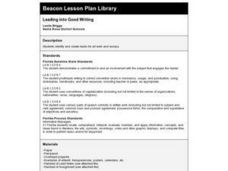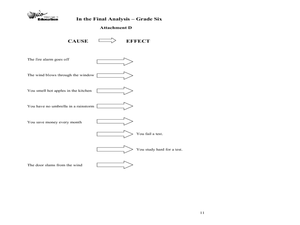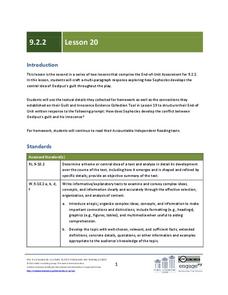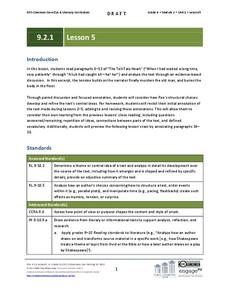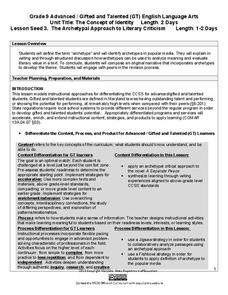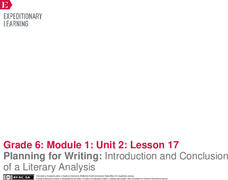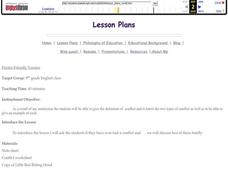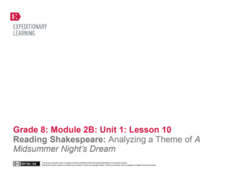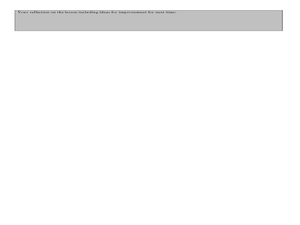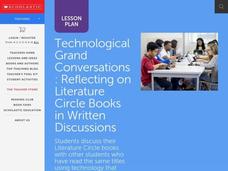Curated OER
Leading into Good Writing
Discuss the importance of a lead in writing with your upper graders. They examine several examples of leads from literature and practice writing leads for pieces of artwork. They then select a topic from a list and write an introductory...
Curated OER
The Final Analysis: Cause and Effect, Fact and Opinion
Middle schoolers read and review informational texts, analyze cause and effect, and distinguish fact from opinion. They assess a "one-minute mystery" you read aloud for cause and effect relationships. Resource includes complete set of...
EngageNY
Grade 9 ELA Module 2, Unit 2, Lesson 20
Oedipus' lack of literal and figurative vision does not mean he cannot see his guilt in the terrible fates of Laius, Jocasta, and all the lives touched by prophecy. Conclude a literary analysis unit on Sophocles' Oedipus the King with a...
EngageNY
Grade 9 ELA Module 2: Unit 1, Lesson 5
Eager readers have waited a long time, very patiently, for a set of literary analysis lessons that connect text structure to the work's central idea. As ninth graders continue reading "The Tell-Tale Heart," they focus on the central...
EngageNY
Grade 9 ELA Module 2, Unit 2, Lesson 10
The slow curse of realization begins to sink in during the tenth lesson in a literary analysis unit on Sophocles' Oedipus the King. Ninth graders carefully read the selected lines for evidence of Oedipus' feelings during a turning point...
Maryland Department of Education
The Concept of Identity Lesson 3: The Archetypal Approach to Literary Criticism
As class members continue their study of approaches to literary criticism, readers examine the symbolism and archetypal patterns in John Knowles' A Separate Peace, and how these parallels are used to develop a theme in the story.
EngageNY
Grade 9 ELA Module 1, Unit 1, Lesson 17
Eighth graders demonstrate their understanding with the final assessment in a literary analysis unit based on Karen Russell's short story, "St. Lucy's Home for Girls Raised by Wolves." Having prepared for the assessment in the last few...
Syracuse University
Ancient World Writing System
Most twenty-first century pupils don't know how to interpret cuneiform. Examining images of cuneiform and papyrus writing and using a chart and Venn diagram, young historians extrapolate what life may have been like for people who lived...
EngageNY
Analyzing Evidence: Writing about Theme
Class members prepare for the end-of-unit assessment by analyzing a writing prompt. They complete a Being Made Invisible anchor chart and write their thoughts about captives and invisibility on sticky notes. In addition, they discuss...
EngageNY
Planning for Writing: Introduction and Conclusion of a Literary Analysis
It's all about the introduction. Scholars work on the introductory paragraph for their essays, connecting the theme of a myth and The Lightning Thief. They use a graphic organizer to help focus their work and then move to working on the...
Curated OER
Conflict
Though the lesson plan format is simplistic, it's got some good ideas for addressing internal and external conflict in your literary analysis unit. Using "Little Red Riding Hood" and other fairy tales, young readers identify the...
Novelinks
The Little Prince: Concept/Vocab Analysis
Focus on the literary elements of Antoine de Saint-Exupéry's The Little Prince with a concept analysis sheet. With suggestions and explanations for many of the book's concepts, vocabulary, and other issues that may arise in instruction,...
EngageNY
Writing an Analysis Essay: Introducing the Writing Prompt and the Model Essay
A model analysis essay provides writers with an opportunity to examine a response to the end-of-unit assessment writing prompt. Scholars define key words in the prompt and discuss how the model essay meets the demands in the prompt....
EngageNY
Reading Shakespeare: Analyzing a Theme of A Midsummer Night’s Dream
After finishing Act I, scene 1 from Shakespeare's A Midsummer Night's Dream, class members study the theme of control as it relates to the play and start an Evidence of Control note-catcher worksheet.
Literacy Design Collaborative
Text Analysis and Character Revelations: Flowers for Algernon
What does your character reveal about you? Scholars carry out several activities to determine the reveal of character in Flowers for Algernon. Readers answer text dependent questions, complete diary entries, write reflections, and use...
Curated OER
Literary Response and Analysis Theme Literature
Analyze the central idea or literary theme found in a series of quotes from the Shakespearean play, Hamlet. For literary analysis, learners paraphrase excerpts from the play and then identify the characters' motivations for their speech.
Curated OER
Identifying Personification in Poetry
Improve your young poets' descriptive writing with this lesson on personification. A SMART board and PowerPoint presentation guide your class through the process of identifying human qualities attributed to various non-human objects. A...
Curated OER
The Effects of Slavery
The emotional and spiritual oppression of slavery in the African-American experience is the focus of this instructional activity. Middle schoolers analyze various texts by Frederick Douglass and Maya Angelou related to freedom and...
Curated OER
Children's Media and Censorship
High schoolers form opinions about children and television censorship after analyzing literature. They complete a journal writing activity to identify the topic and make a list of inappropriate television shows for children. Next, they...
Curated OER
Technological Grand Conversations
Conduct a written literary discussion and diminish stress about public writing. Class members, already arranged into literature circles, compose and post responses to novels, signing with initials or class number. The process continues...
Maryland Department of Education
The Concept of Identity Lesson 2: The Historical/Biographical Approach
"How does our environment shape our identity?" After researching biographical information about John Knowles and considering how these experiences are reflected in A Separate Peace, class members consider the strengths and weaknesses of...
Curated OER
What a Character!
Middle schoolers read a novel and discuss character personality. First, they analyze a character in a novel and keep a chart or web of the character's identity, which includes specific examples from the book. They then write a script...
Curated OER
After Reading: "Plot the Plot" Activity in the Library Media Class
"Plot the plot" of "The Adventures of the Speckled Band" with your young readers. Take a few days to read Sir Arthur Conan Doyle's short story as a class or in pairs, having learners write down what they consider to be the most important...
Curated OER
Introduction To Literary Analysis
Explore the fascinating ways in which authors use specific literary devices to create interesting and realistic texts. Using non-fiction articles with the subject of rogue waves, an excerpt from The Perfect Storm, by Sebastian Junger,...


